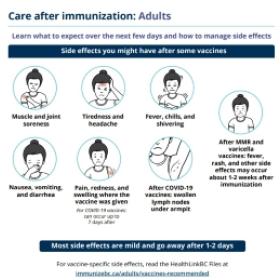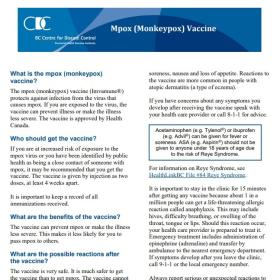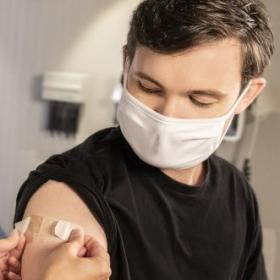On March 31, the ImmunizeBC website will move over to HealthLinkBC.ca After this date, you will be automatically redirected to HealthLink BC’s Immunization landing page. HealthLink BC provides trusted health information online and over the phone 24 hours a day, seven days a week by calling 8-1-1.
Date last reviewed:
Friday, Dec 20, 2024
On this page:
- Disease it protects against
- How the vaccine is given
- Who should get the vaccine
- Book an appointment for your first or second dose
- How well it works
- Safety
- Side effects
- How to manage side effects
- Who should not get the vaccine
- Are there other considerations to getting the vaccine?
- Mpox disease quick facts
- Community resources
Information
Translated resources
Fact
Did you know?
Since May 2022, an African strain of mpox has spread to over 70 countries where mpox does not normally occur, including Canada. After a vaccine campaign in the summer of 2022, the number of mpox cases in BC dropped dramatically. However, there continues to be a low level of spread.
How the vaccine is given
The vaccine can be given in two ways:
- Before exposure to the mpox virus to help protect against mpox.
- After exposure to the mpox virus to prevent illness or severe outcomes.
Who should get the vaccine
Those eligible for the mpox vaccine include:
Two-Spirit and transgender people and cisgender males who self-identify as belonging to the gay, bisexual, and other men who have sex with men community and answer yes to any of the criteria below:
- Has sex with more than one partner.
- Has sex with a partner who has more than one partner.
- Has casual sex (e.g. cruising).
- Engages in sex work as a worker or client.
The vaccine is not available to individuals of any gender who are not part of the community of gay, bisexual and other men who have sex men, unless they have been identified as a close contact of a confirmed case.
The vaccine is given as a series of two doses. You must wait at least 28 days after your first dose to get your second dose. At this time, there is no recommendation for a booster dose following a two-dose series.
The vaccine cannot be administered to people who have symptoms that could be due to mpox. Instead, find a location for testing.
Vaccination has been offered to at-risk populations since June 2022.
Book an appointment for your first or second dose
To book an appointment, refer to your region:
How well it works
The vaccine can prevent mpox or make the illness less severe. This makes it less likely for you to pass mpox to others. No vaccine is 100% effective. If you have been vaccinated and develop symptoms, follow these steps if you become ill to protect yourself and others.
Safety
The vaccine is very safe. It is much safer to get the vaccine than to get mpox. The vaccine cannot give you mpox.
Side effects
Many people have no side effects from vaccines. For those that do, they are usually mild and go away on their own within a few days. Serious side effects are very rare.
Common reactions to the vaccine may include:
-
Soreness, redness, swelling, itching and a lump where the vaccine was given.
-
Other reactions include tiredness, headache, fever, chills, muscle or joint soreness, nausea and loss of appetite.
Reactions to the vaccine are more common in people with atopic dermatitis (a type of eczema).
It is important to stay in the clinic for 15 minutes after getting any vaccine because there is an extremely rare chance of a life-threatening allergic reaction called anaphylaxis. If anaphylaxis happens, you will be given medicine to treat the symptoms.
If you have concerns about any symptoms you develop after receiving the vaccine, speak with your health care provider or call 8-1-1 for advice.
How to manage side effects
For information on how to manage side effects, view the immunization aftercare sheet below.
Who should not get the vaccine
Speak with your health care provider if you have had a life-threatening allergic reaction to:
- A previous dose of a smallpox or mpox vaccine.
- Any part of the mpox vaccine, including ciprofloxacin, gentamicin or chicken protein.
There is no need to delay getting immunized because of a cold or other mild illness. However, if you have concerns, speak with your health care provider.
Are there other considerations to getting the vaccine?
Speak with your health care provider if you:
- Have an immune system weakened by disease or medical treatment.
- Are pregnant or breastfeeding.
Mpox disease quick facts
- What is mpox?
-
Mpox is a disease caused by the mpox virus. It is usually a mild illness and most people recover on their own after a few weeks. Children, pregnant people, and people with weak immune systems may have a more serious illness.
- How does it spread?
-
Mpox typically spreads from person to person through close, personal, often skin-to-skin contact, including through:
- Direct contact with sores or an affected mucosal area of a person with Mpox.
- Contact with items like bedding or towels that have been used by someone with Mpox.
- Respiratory droplets during prolonged close, face-to-face contact with a person who has Mpox, such as kissing.
Most people in B.C. with Mpox were exposed during close, intimate contact during sex. It can also be spread through contact with objects and from animals to humans. - What are the symptoms?
-
Symptoms of mpox occur in 2 stages. In the first stage, symptoms can include fever, chills, intense headache, swollen lymph nodes, back pain, muscle soreness and weakness, or lack of energy. Other symptoms may include sore throat, cough, nausea, vomiting or diarrhea.The second stage of the disease usually begins about 1 to 3 days after the first stage symptoms appear. Symptoms of the second stage include a rash that often starts on the face or legs and arms. It can also appear on other parts of the body, such as the hands, feet, mouth, genitals and anus. The rash changes in appearance over time from raised spots to small fluid-filled blisters or sores, which will form a scab and fall off. Symptoms of mpox may last 2 to 4 weeks.Some people experience symptoms differently. For example, they may not have first-stage symptoms but will develop sores. They may have sores on only one or a few parts of the body.It can take up to 21 days to develop symptoms of mpox after being exposed to the virus.
- Travel and mpox awareness
-
Be aware of the mpox situation in the places you visit, and take the same precautions you would use at home. Some people have been exposed or got mpox from close contact during sexual activity while traveling. You can find more information on travel on the BCCDC's mpox page.
Community resources
- Factsheet on Mpox Recommendations for Two-Spirit, Gay, Bisexual, Transgender, and Queer (2SGBTQ+) Communities.
- A 3-page hangout developed to support conversations about mpox among First Nations, Inuit, and Métis Peoples.
- Monkeypox Guidance for Events during Pride Festival Season




